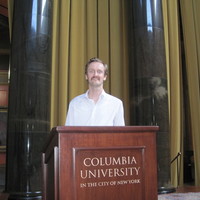Books by Phillip Barron

Winner of the 2019 Nicolas Guillen Outstanding Book Award, given for philosophical literature by ... more Winner of the 2019 Nicolas Guillen Outstanding Book Award, given for philosophical literature by the Caribbean Philosophical Association.
Winner of the 2015 Michael Rubin Book Award from Fourteen Hills Press.
What Comes from a Thing is the first collection of poetry from Phillip Barron.
This volume takes as its subjects presence and absence after the death of manufacturing and the disintegration of the working class under twenty-first century capitalism. These poems embody the sounds and rhythms of factories, industrial farmlands, and ports of late modernity. Whether rural or urban, the places—like the aesthetics—of these poems have survived the shift to a post-industrial economy and merit deep attention for the role they play in constructing the materiality and ideal of our daily experiences. The book resides in this very tension between idealism and materialism, where “we manufacture footnotes now, echoes of all else/that we have forgotten/how to make.”
For four years, readers of The Herald-Sun newspaper (Durham, NC) enjoyed Phillip Barron's monthly... more For four years, readers of The Herald-Sun newspaper (Durham, NC) enjoyed Phillip Barron's monthly columns on bicycling. The Outspokin' Cyclist gathers some of the best columns together in one volume. With insights into cold-weather bike commuting, urban design, the spiritual solitude of solo mountain biking, and the philosophical problems with drug use in competitive sports, Barron's columns offer glimpses into the life of a cyclist and a small city's biking community. The resulting book will appeal to residents of the Bull City as well as those unlucky enough not to know Durham, to cyclists as well as readers who simply enjoy a good story.
Poetry by Phillip Barron
Two poems, "Apex Obscura" and "The Scarecrow," in Issue 33 of New American Writing.
Brooklyn Rail, Jul 2015
Four new poems in the July/August 2015 issue of Brooklyn Rail
Janus Head, Jun 2015
Two poems from the summer 2015 issue of Janus Head. These come from a series of poems on philosop... more Two poems from the summer 2015 issue of Janus Head. These come from a series of poems on philosophical problems. The first concerns the accessibility of knowledge about the past. The latter is after the Ship of Theseus paradox.
Columbia College Literary Review
Papers by Phillip Barron
Transformations, Apr 1, 2011
Radical Philosophy Review, 2000
In 1972, the US Supreme Court held, in Furman v. Georgia, that capital punishment, as applied in ... more In 1972, the US Supreme Court held, in Furman v. Georgia, that capital punishment, as applied in the United States, violated the US Constitution. Each Justice concurring in the decision of the Court issued a different opinion about how the death penalty violated constitutionally ...
Philosophy and Literature, 2017
A close reading of Mary Robinson’s late-eighteenth-century poem “London’s Summer Morning,” which ... more A close reading of Mary Robinson’s late-eighteenth-century poem “London’s Summer Morning,” which captures all the noises and smells of a busy London street, is not enough to convince the reader that it isn’t all a dream. But whose dream? René Descartes and Wallace Stevens suggest that it may not matter.
Sophia and Philosophia: Essays and Explorations, 2019
The influence of surrealism and a 1927 visit to Paris on William Carlos Williams
Are the humanities lost amid the code and data of the digital humanities? It need not be so.
Although the demographics on male versus female death-row prisoners suggest that males are the cr... more Although the demographics on male versus female death-row prisoners suggest that males are the criminal justice system’s primary targets, I argue that the system also discriminates against women. Utilizing contemporary feminist theories of gender, I argue that female prisoners are punished primarily for violating norms of gender correctness.
Book Reviews by Phillip Barron
Book review of the poetry collection Swimming Home, by Vincent Katz.











Uploads
Books by Phillip Barron
Winner of the 2015 Michael Rubin Book Award from Fourteen Hills Press.
What Comes from a Thing is the first collection of poetry from Phillip Barron.
This volume takes as its subjects presence and absence after the death of manufacturing and the disintegration of the working class under twenty-first century capitalism. These poems embody the sounds and rhythms of factories, industrial farmlands, and ports of late modernity. Whether rural or urban, the places—like the aesthetics—of these poems have survived the shift to a post-industrial economy and merit deep attention for the role they play in constructing the materiality and ideal of our daily experiences. The book resides in this very tension between idealism and materialism, where “we manufacture footnotes now, echoes of all else/that we have forgotten/how to make.”
Poetry by Phillip Barron
Papers by Phillip Barron
Book Reviews by Phillip Barron
Winner of the 2015 Michael Rubin Book Award from Fourteen Hills Press.
What Comes from a Thing is the first collection of poetry from Phillip Barron.
This volume takes as its subjects presence and absence after the death of manufacturing and the disintegration of the working class under twenty-first century capitalism. These poems embody the sounds and rhythms of factories, industrial farmlands, and ports of late modernity. Whether rural or urban, the places—like the aesthetics—of these poems have survived the shift to a post-industrial economy and merit deep attention for the role they play in constructing the materiality and ideal of our daily experiences. The book resides in this very tension between idealism and materialism, where “we manufacture footnotes now, echoes of all else/that we have forgotten/how to make.”
You might have noticed that Dante’s comments on bike thieves did not make it into the original edition of The Divine Comedy. Dante’s journal tells us that the omission resulted from his editor’s fascination with more complicated technologies: carts put before horses and what not. Disappointed that mention of his velophilia did not make it into his magnum opus, Dante later published the Canto concerning bike thieves independently under the title “Tractatus di Ciclisma.” A rare copy of the Tractatus recently resurfaced during an excavation in Florence.
In an effort to correct his editor’s mistake, Urban Velo republished the text for the first time in seven hundred years.